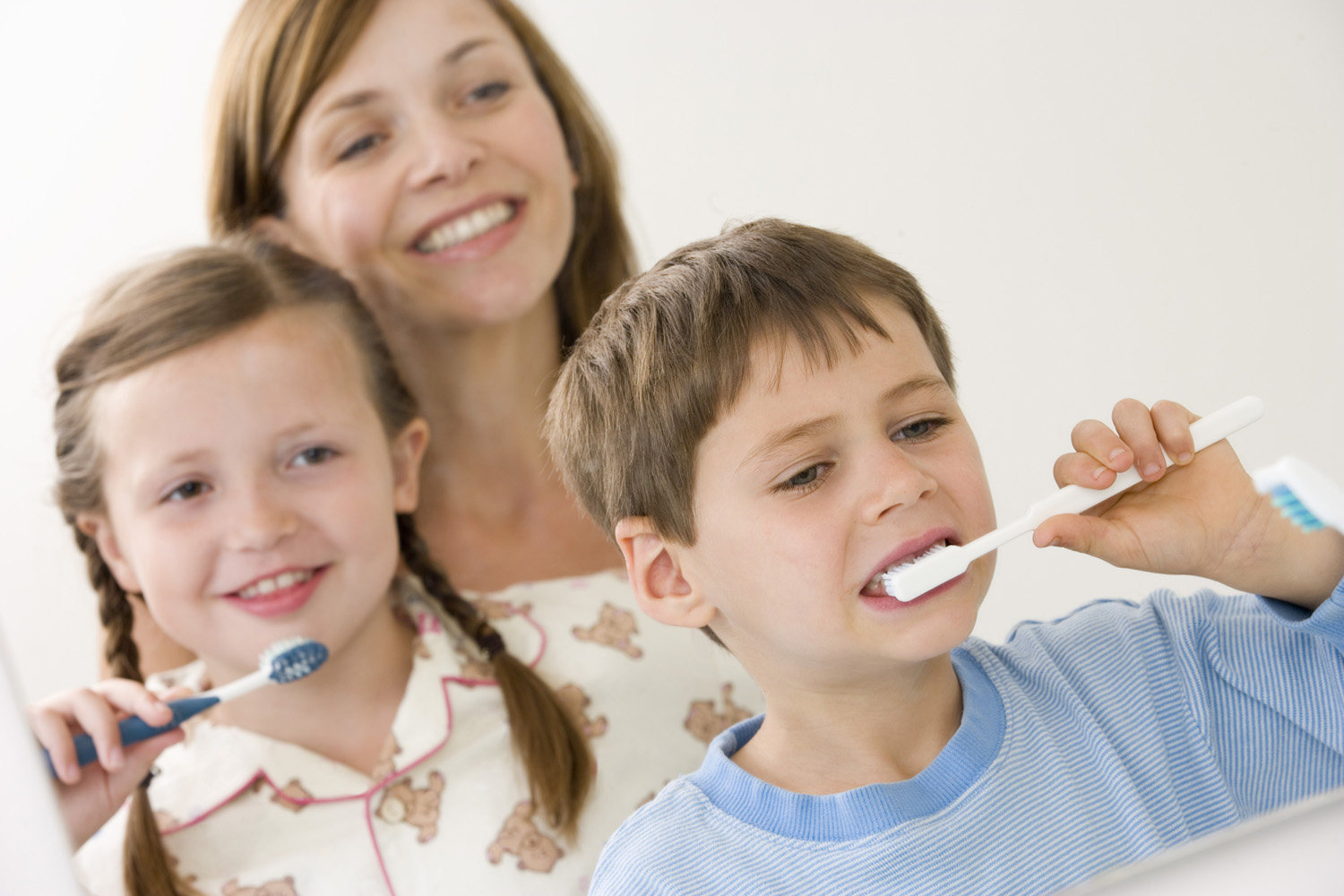Getting kids to brush their teeth is hard.
Tooth brushing is boring, repetitive and good for your health—could you think of a more perfect combination to foster hatred from kids?
If you show a child how to brush their teeth and then just leave them to it, only one thing will happen: they’ll forget exactly what you showed them (that’s if they were listening anyway) and will “brush their teeth” in whatever way feels right to them.
Instead, teaching kids to brush their teeth properly is a longer process than just showing them how to do it and leaving them to get on with it.
In fact, showing children how to brush their teeth in a way that actually gets them doing it takes 7 steps…
…and here they are:
1) Teach your child to value their teeth.

This is probably the most important step in getting a child to brush their teeth properly.
I’d say that at least once a day I hear an adult patient say: “I wish I had taken better care of my teeth as a child”.
I hear it constantly.
It’s not surprising that children do not care about looking after their teeth, most children under the age of 13 have never had a serious dental problem.
No problem means there’s nothing to worry about, right?
Most adults fall into this trap; how many of you can honestly say that you go to the GP as a precaution, rather than just when anything specific flares up?
So if most adults have this kind of thinking, we cannot possibly expect our kids to be any better.
You therefore need to teach kids to value their teeth. That way they will be motivated to brush them.
No idea how to teach this to your child?
Well ask yourself: how does having teeth benefit a child?
For starters, you can’t eat without teeth; kids love to eat.
Good teeth are also essential to looking good, and everyone loves being told that they’re beautiful (even if they pretend that they don’t.)
So that’s two good places to start when teaching children to value their teeth.
Quite simply you need to point out moments that your child is benefitting from having healthy teeth.
Examples:
“Louisa’s mum said she loves your beautiful smile and I do to, thank you for letting me brush your teeth every day, it makes you look so pretty/handsome.”
or
“This is why I’m so happy you brush your teeth every day, so you can enjoy that lovely lamb chop with your amazing teeth.”
Obviously change this to something that would resonate with your child.
Notice how in both these examples it was pointed out how having their teeth brushed/brushing their teeth is what causes your child to benefit from having good teeth.
That point is key and I’ll get back to it in the next step.
Age to start doing this: from 3 years old.
2) Show your child consequences of not brushing (in an engaging and non-judgemental way).

Children need to realise that brushing (and eventually flossing) their teeth is what keeps their teeth looking good and working well.
Dentists have always known the importance of this but it have often been pretty bad at explaining this—often making the child feel embarrassed about the state of their teeth.
This can lead to a resentful attitude and kill your child’s motivation to keep their teeth healthy.
I think that if done correctly, a parent can be very effective in showing a child the importance of brushing, and the consequences of not doing it.
You can do this by explaining to them some of your dental issues, how unpleasant they were (you can embellish if you need to) and explaining that they came about due to inadequate brushing (again, labour the point if you need to).
If you do not have any dental issues, you can use the example of another adult who your child likes or looks up to.
Not only does this help the child understand that brushing their teeth properly is a worthwhile thing to do, but it also shows them that dental problems can happen to anyone.
This can reduce any embarrassment about dental problems and encourage pro-active behaviour, rather than avoidant behaviour, towards their oral health.
Age to do start doing this: from 4 years old.
3) Have your child with you when you brush your teeth.

Brushing your teeth in front of your child will do two things:
Firstly, it will show your child that brushing your teeth is just something that is always done in the morning and before bed at night. This makes it no different from eating or putting clothes on.
As well as this, it will show them how long brushing their teeth should take, and that a morning/bedtime routine should always incorporate time for this.
You can make this easier for yourself by just brushing your teeth before or after you brush your child’s teeth.
You do not have to this every day, in fact doing so may cause your child to associate brushing their teeth even more strongly with boredom, but its definitely worth doing it every now and then.
Age to start doing this: as early as possible.
4) Have a dentist show you how to teach your child to brush.

A dentist alone will not be able to teach a child how to brush their teeth (unless the dentist is also the child’s parent).
This is because learning to brush your teeth properly requires “deliberate practice”. It therefore takes time, requires feedback from a teacher, and should be expected to be difficult.
As the process of learning takes time, the parent must be the “teacher” in this context.
Being able to brush your teeth, and being able to teach someone how to brush their teeth is not the same thing.
Part of a dentist’s job is to teach people how to brush, but they do not have the necessary “contact time” to teach a child how to do this in any substantial way.
You therefore need to learn from a dentist how to teach this effectively.
Ask your dentist (or hygienist) specifically to teach you how to teach your child to do this.
The best time to do this is when the dentist/hygienist is teaching your child, so you can do exactly what they do (just with more regularity).
Age to start doing this: 5 years old.
5) Be very gradual when teaching your child how to brush their teeth.

Learning to brush your teeth is something that is learned primarily by feel. It’s not something that can be taught theoretically.
When you are learning anything by feel it takes time.
You need to learn how doing the action properly “feels” and then how to mimic that feeling consistently and dynamically from tooth to tooth.
This is not something that your child will just be able to do after being shown it just once.
Rather, you are going to have to show them many, many times, possibly on a tooth-by-tooth basis.
The process will involve a lot of back-and-forth between you and your child as you show them how it’s done, they try and mimic it, and then you correct them.
It’s a process that could take a while and could involve having some days where you do the brushing, some days where your child does it, and some days where it’s a bit of both.
So what I’m trying to say is don’t rush it, and don’t think that just because your child has brushed their teeth by themselves that they can now do it unsupervised every day.
Age to do this: 5-8 years old (depending on your child’s progress).
6) Make it a competition.

This is kind of a theme on the whole “make brushing fun for kids” idea that a lot of dentists like to talk about.
In principle they are correct, tooth brushing is boring, repetitive, but necessary. Therefore making it more fun and engaging is a good idea (especially for a child).
How you do this is really depends on your child and what they are like.
One suggestion I have is that to make a little competition out of brushing teeth.
Most kids are competitive and just love the idea of being better at something than their parents.
So here are two ideas that you could do:
- Who can brush their teeth longer: you or your child.
- How many times in a row can your child brush without your input (assuming that you jump in when they’re doing it wrong or stop too soon).
An important thing to note here is often kids of a certain age (and particularly boys) equate brushing harder with brushing better.
Brushing too hard is the main cause of sensitive teeth so you need to make sure that that doesn’t happen.
If you’re child isn’t the competitive type or simply isn’t interested, you can try another way to try and make brushing more fun.
An often-repeated example of this (that probably works) is having a song you and your child always listens to when you brush.
This works well because many songs are 3 minutes long so once the song is done the teeth are well brushed.
Age to do this: 7 years old onwards.
7) Make it a necessity.

You don’t need to repetitively tell children to put their clothes on before they go to school; it’s done just because that’s what has to be done.
You need to try to make your child see brushing their teeth as important as putting on their clothes before they leave the house.
If you’ve drummed into them the importance of their teeth, and that brushing their teeth is essential to looking after them, then you have gone some way to making this happen.
You also need to ensure that tooth brushing is not something that is skipped if you’re running a bit late or your child is just feeling lazy.
You can ensure this by setting out a specific slot in the morning routine for brushing teeth and (on weekends at least) refusing to move on with the day until their teeth have been brushed.
This is almost definitely the hardest step, but it is very important.
The people who seem to have the best teeth are always the ones who brush their teeth no matter what situation they’re in.
To them it’s an absolute necessity, and this kind of attitude begins in childhood.
Age to start doing this: as early as possible.




